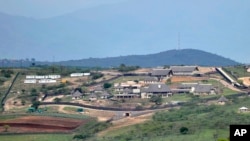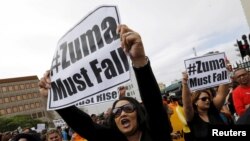President Jacob Zuma must pay back about $500,000, or three percent of the public funds used to upgrade his personal country home, says South Africa's treasury.
The nation's highest court has accepted the report, but the president’s critics say they’re still not happy.
Once South Africa’s Constitutional Court finalizes its Tuesday ruling, Zuma will have 45 days to pay back the money into the nation’s coffers for upgrades he made to his rural homestead, called Nkandla.
In 2014, the nation’s top anti-corruption czar determined that Zuma “benefited unduly” by using about $23 million of government money to upgrade his home.
Zuma’s camp said the improvements were necessary security measures befitting a head of state.Public Protector Thuli Madonsela disagreed, saying he should not have used public funds for a swimming pool, cattle enclosure, chicken run, amphitheater and visitor center.
David Lewis, executive director of Johannesburg-based Corruption Watch, says South Africans want more from their president.
“I’m not surprised at the figures,” he told VOA.“I don’t think that the public are going to be satisfied with it, and they aren’t, quite clearly.... because there’s a widespread belief that the president benefits unduly from public resources over a range of fronts, and it’s an entirely justified perception, quite honestly.”
Perception of corruption
Lewis says South Africans believe their leaders are corrupt because they often encounter corruption in their daily lives.That sense that corruption permeates the government is cause for concern, he said.
“The perception of corruption is really very high,” he said. “And the perception that government is not doing enough, it is also very high… and that should be good enough for any accountable government to be very robust in opposing it.”
This is not President Zuma’s only brush with corruption allegations. In 2007, he faced a court case over 783 charges of fraud, corruption and racketeering over an arms deal. The court dropped the charges in 2009, clearing the path for him to rise to power. The case has recently been resuscitated and Zuma may have to appear in court over these charges.
Predictably, the corruption allegations have become politicized, with the opposition Democratic Alliance insisting that his alleged pattern of corrupt activities is grounds for removal and the far-left Economic Freedom Fighters repeatedly disrupting parliamentary sessions by demanding that he “pay back the money.”
In April, the opposition mounted an impeachment attempt in parliament over the home upgrades.The measure was easily defeated by Zuma’s African National Congress, which holds a wide majority.
Democratic Alliance spokesman Mabine Seabe says his party will continue to pursue other corruption allegations against Zuma. He also said the party didn’t think the treasury’s bill was enough.
“As a party, we believe strongly that this figure should have been much higher,” he said.“Because the president personally defrauded the people of South Africa as well as stole money from the people of South Africa through this Nkandla project, which enriched himself as well as his family.”
But $500,000 is still a lot of money in today’s South Africa, one of the most unequal societies in the world.The amount is just under three times Zuma’s annual presidential salary.But according to the nation’s statistical agency, it would take the average South African more than 370 years to earn that sum.
Zuma’s office did not answer calls seeking comment.But his office issued a statement alerting South Africans to a novel new scam, a fake crowdfunding account set up to help him pay the bill.
His office warned South Africans not to fall prey to such criminals.






